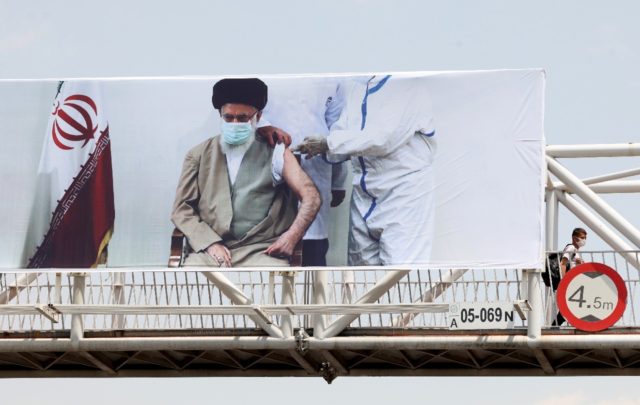President Hassan Rouhani expressed fears Saturday that Iran will be hit by a new wave of Covid-19 due to an outbreak of the Delta variant in the Middle East’s hardest-hit country.
“It is feared that we are on the way to a fifth wave throughout the country,” Rouhani told a meeting of Iran’s anti-virus taskforce, warning the public to be careful as “the Delta variant” had entered the country from the south and southeast.
Covid-19 has killed more than 84,000 people out of over 3.2 million infections in Iran, according to official figures that authorities admit do not account for all cases.
Delta, first detected in India and now present in at least 85 countries, is the most contagious of any Covid-19 variant yet identified.
The Islamic republic confirmed three cases of the Delta variant on May 5 in the central province of Qom.
Iran’s health ministry has classified as “red” — the highest category on Iran’s coronavirus risk scale — the capital Tehran and nine other cities in Tehran province.
The southern and southeastern provinces of Fars, Hormozgan, Kerman and Sistan-Baluchistan are also now classified as “red”.
In red zones, all shops must stay shuttered except for those considered essential, including grocery stores and pharmacies.
People on the streets of Tehran voiced their frustration with the situation.
“People are really tired of wearing masks, washing their hands, not visiting each other, and not travelling,” said Maryam, a teacher. “They can’t stand it anymore.”
Narsis, a public sector worker, said the cycle of new waves of infection followed by stricter measures was testing everyone’s patience.
“People are no longer as hygienic as they used to be, and fewer are wearing masks,” he told AFP.
“The borders are open and travellers come from India and Pakistan… This cycle just keeps repeating, and won’t be interrupted until people get vaccinated.”
Border controls
Authorities in Sistan-Baluchistan province said on Wednesday that they had closed travel across the border with Pakistan until further notice, although goods transport by road would be permitted.
On Saturday, Alireza Raisi, the spokesman for the anti-virus taskforce, called for “strict controls of the country’s borders”, especially those on the eastern side of Iran.
Strangled by US sanctions that have made it difficult to transfer money to foreign firms, Iran says it is struggling to import vaccines for its population of 83 million.
Just over 4.4 million people have received a first dose of anti-Covid vaccine in Iran, while only 1.7 million have received the necessary two jabs, the health ministry says.
“God willing, the situation will improve in terms of vaccinations from next week,” said Rouhani.
The authorities in Iran have approved emergency use of two locally produced vaccines.
Supreme leader Ayatollah Ali Khamenei received the first dose of one on June 25, his office announced on Twitter.
“We have to follow exactly all the rules we have issued for the red zones” and other virus-hit areas, Rouhani said, stressing that “if the guidelines are questioned or not followed, we will have a problem”.
The outgoing Rouhani administration has drawn criticism for its handling of the pandemic.
Rouhani, a moderate, is in the final weeks of his presidency having served the maximum of two consecutive terms.
He will be replaced in August by ultraconservative cleric and former judiciary chief Ebrahim Raisi.
The health ministry on Saturday reported 111 new Covid deaths and another 8,341 infections in Iran, taking the overall number to 84,627 fatalities and 3,241,037 cases.

COMMENTS
Please let us know if you're having issues with commenting.